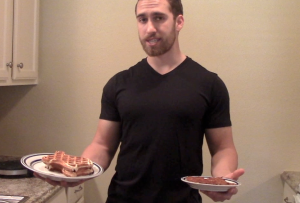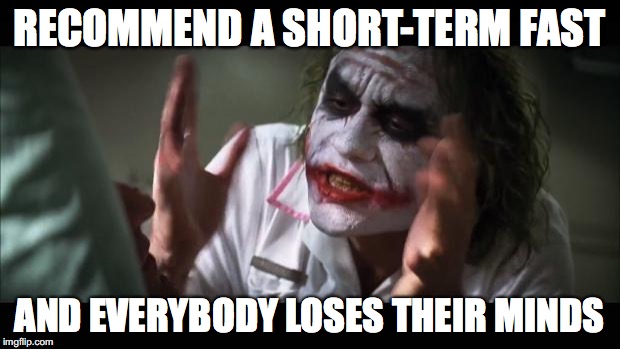Often heard as the most important meal of the day, breakfast is generally accepted as necessary for health and fitness. As one to push the envelope and/or stir the pot, if you will, I’ve decided to give you the truth about breakfast. Is it necessary? Of course not and, in fact, it may be better to skip it!
Ever wish you could go back in time and kick your own butt? I sure do. I use to be one of those people who pushed breakfast. “It’s the most important meal of the day. You need it to get your metabolism up and running.” Give me a break!
Now, there are studies that show people who eat breakfast tend to be a lower body weight, etc. However, how significant are these findings?
Common Literature – Debunked
The people who push these studies as evidence are typically ones who short change the general public. They only read the abstract and act as if it has no flaws. I choose a more difficult and less travelled road. That’s just my style. Am I saying there is no relevant statistical evidence? No of course not. I’m just begging you to see the whole picture and decide for yourself. Don’t take the yikkity yakking bobbling head’s word for it.
Take for example this study here by Heather et al. This is an inside look at various studies showing how appetite is affected by meal frequency. If you have read any of my other posts (highly recommended), you would know that there is a difference between appetite and hunger. Hunger is the body’s need for fuel while appetite is a learned behavior usually associated with an environmental stimulus (i.e. presence of food).
Most of the studies used in this were based off participant’s perception of appetite and/or hunger.
Perceiving: to become aware of, know, or identify by means of the senses
(compliments of dictionary.com)
I find this to be rather subjective. Seeing that there is no clear cut difference between hunger and appetite that exists outside each individuals mind, let’s break it down like this… Have you ever been in a restaurant and was completely full from appetizers and your meal, then when a desert option arose you decided that you had a little room for it? By no means was that hunger. Strictly an appetite response and quite the phenomena (I touched on this a bit in 5 Holiday Diet Tips.)
Similarly, these studies gave people specific caloric guidelines for a number of meals and then allowed them to eat as much as they wanted. It found that those who had a lower meal frequency had a tendency to eat more. It’s also worthy to note that glucose levels and insulin response was no better with an increased (>3 meals) meal frequency. Low blood sugar levels are usually associated with an increase in appetite. However, that is not the culprit to blame here, but I digress.
Based on these studies, the claims in the mainstream media of reduced hunger and improved glucose and insulin control with increased eating frequency are unsubstantiated. (Heather et al)
The main variable at play here is the individuals perception of hunger/appetite. This is highly individualistic and can vary from person to person. To say that everybody who skips breakfast is more likely to be overweight, is incorrect.
It is very likely that people who eat breakfast put a priority on their health and well-being. These dedicated individuals are more likely to also implement healthy lifestyles and stay physically active, agree? While those who are not particularly concerned with their health and wellness overall have a greater tendency to skip breakfast (not a priority) and not partake in physical exercise. To me, this theory is very weak and having been a breakfast skipper for the past 2-3 years, I can attest to breakfast not being necessary.

Frail and weak physique, direct result of all those days skipping breakfast.
Break-Down
Breakfast is mostly associated with the first meal of the day in the morning hours. If we take a closer look, we will see that breakfast is a two syllable word, break and fast. So, technically breakfast is breaking a fast. Typically, breakfast is breaking an overnight fast. Having said that, breakfast could be at 6 PM. Basically, breakfast is any meal after a period of fasting. Fasting can be considered from 8-36 hours.
However, the term breakfast will be used as the morning meal after an overnight fast from here on out. This should eliminate any confusion and/or rebuttles to interpretation.
Primer on Cortisol
Cortisol often gets a bad reputation. It is considered to be catabolic, which for many bodybuilders is feared like the plague. It is a hormone that responds to stress. Any and all stress. Cortisol levels are necessary and are healthy in needed amounts. During times of pain and/or stress cortisol is released to help alleviate pain and allow you to push through. Don’t think you need cortisol, try doing a leg day without it.
Cortisol responds to stressors. Many people don’t consider waking up from bed a particularly stressful event. However, for the body, it certainly is. Somewhere in the range of 30-90 minutes before waking your body begins to secrete cortisol, in order to wake you up. This is known as the Cortisol Awakening Response (CAR). Cortisol levels peak in the morning time about 30-45 minutes after you’re out of bed.
Typical Break-Fast
Think about your typical breakfast: pancakes, waffles, yogurt, cereal, biscuit, donuts, possibly eggs and bacon, oatmeal, etc. For many who don’t put protein high on the macronutrient priority list, there is a great chance that the majority of those calories are from carbohydrates. Sure, carbs give you energy and are the body’s preferred energy source, but I beg you to see the horse of a different color.

One must ask themselves, “what am I doing today that I need all these carbs?” If you don’t have a very strenuous job or active lifestyle, chances are you got more than enough energy stored up (via fat cells)! You don’t put gas in your lawn mower ever 20 minutes to make sure it has enough to finish the job. You run it until it’s out and then fill it up. Same should be taken with your body. I don’t want to get off track on carbohydrates here as there will be many blogs to come on that issue, I’m sure.
In this case, carbs are relevant because they cause an increase in the production of insulin. Insulin is a storage hormone. It’s anabolic. It helps you gain muscle and fat as well, for that matter. However, anabolism and catabolism is not the issue I would like to address here. What is more important for us is insulin.
Why Does Breakfast Make Me Hungry?
The combination of an increase in circulatory insulin and peaked cortisol levels could provide the answer to that question. Although not conclusive (nothing ever is in this field), there is some pretty significant data that this duo could be the reason why you’re so hungry after breakfast.
There is even reported data that those who choose a higher protein-filled meal at breakfast time still report a post-breakfast hunger. The combination of higher cortisol levels and an increased insulin response could play a role.
The morning peak in cortisol levels is the only time of the day that levels are high enough to exert an acute and significant affect on feeding-induced insulin response.
For Average Joe who is insulin resistant, overweight, or out of shape, these things could potentially make eating breakfast a hazard. The inability to regulate insulin effectively combined with the CAR which increases insulin levels higher than at any other time of day, and a high carb breakfast is a recipe for disaster. High insulin levels must come down.
The rapid increase of insulin will result in a much faster return to baseline (AKA blood sugar drop, hypoglycemia). Symptoms include sluggishness, hunger, and in more serious situations (seen with diabetics), coma, brain damage, and possibly death.
But what about Fit Joe?
For those who are more in-shape than the Average Joe, the typical breakfast meal wouldn’t have such of a significant increase in insulin levels but combined with the CAR, one could experience all the symptoms of a peak and crash in blood sugar, as I’ve listed above.
It is interesting that both levels of fitness would experience this phenomena. It just proves that there are metabolic processes that are just not up for debate. Having said that, there is always genetic factors that changes how people respond to various biological process.
“The early insulin response to a meal is higher in the morning than in the afternoon, and this fact can only partially be explained by a moderately increased secretion of incretins. Rapid non-genomic effects of higher cortisol levels in the morning might be, at least in part, responsible for this finding.” (Vila et al)
Individual Factors
As always, genetic factors play an important role. Women typically show a higher CAR than men do. Overall, everybody will experience these things just a bit differently. Having said that, some will be able to strengthen their mind and change the way that they perceive things, becoming Mentally stronger. Everybody has the ability to do this. Some choose to do so, while others do not.
Early Morning Workouts
Kanaley et al concluded that there was a higher cortisol level post exercise at 7 AM compared to workouts at other times throughout the day. It also interesting to note that, the growth hormone release (triggered by exercise) was no different at various times of the day.
Early morning may not provide the ideal time for workouts. However, when is there an ideal scenario/situation in life to do anything? You will never encounter a situation in which all things are perfectly put into place. Many times people read so much information and don’t know what to believe so they don’t do anything. Indecision is a decision, and it’s the wrong one.
Early morning may be the best time for you to workout. Maybe that’s the only time of day you are able to do so. I can assure you of one thing. A workout that takes place in the morning is much better than the one that never happened in the afternoon. If it makes you feel better, my workouts are at 5 AM every morning. I love it and it gets the day started off on the right foot!
No matter how fancy and scientific the speculation is, it is always secondary to real world findings. To find the ultimate truth, one must take book smarts and street smarts place them together and see which one is the better of the two for the individual.
Takeaway
Individual factors always play a role. The CAR is no different. The findings of the of the levels of cortisol upon wakening are very inconsistent within the population. This would explain why some people get the post-breakfast hunger and others do not. Some are wired to eat breakfast and be satisfied until lunch. While others may have a much higher release in cortisol. When they eat breakfast the insulin spike and plummet is exacerbated and causes a very strong appetite response.
I feel like this is a very real biological issue but it can be treated by strengthening the mind and knowing the difference between hunger and appetite. There is no point in sacrificing for the sake of sacrifice. If we can avoid the situation altogether, that would be the best option.
In conclusion, it is completely wrong for people to state that breakfast is the most important meal of the day or any other claim that would imply you’re wrong if you do not eat breakfast. Breakfast is not for everybody. If you’re one of the many who experience this post-breakfast hunger, I would suggest trying intermittent fasting in which you skip breakfast and have your first meal later in the day. For those, who do not experience this rise in hunger after breakfast and/or enjoy eating breakfast, by all means continue to do so.
The bottom line is that each individual must decide which is better for him/her based on such biological issues that I’ve discussed here, environment, and lifestyle. To say that breakfast is good or bad, is too black and white. The true answer lies somewhere in the gray area.
Your body is more than capable of adapting to whichever meal frequency or eating pattern you desire.
As for me, I’ll stick to my one meal a day routine. Tonight, I will celebrate my birthday by eating a few pounds of meat and smoking a cigar overlooking the Music City Skyline. I’ll post pictures below. In the mean time, if this helped you out feel free to share on Facebook, Twitter, Instagram, etc. I have made it easy to do so! Just click the associated link at the top of the page! While you’re at it, go ahead and follow me on those as well and ensure that you don’t miss any upcoming goods!
Until next time, ole LaToof is signing out. Stay Relentless!


References
Berkhan, M. (2012). Why does breakfast make me hungry? Leangains.com. http://www.leangains.com/2012/06/why-does-breakfast-make-me-hungry.html
Heather, L. J., and Campbell, W. (2011). The effect of eating frequency on appetite control and food intake: brief synopsis of controlled feeding studies. The journal of nutrition, 141(1), 154-157. doi: 10.3945/jn.109.114389
Vila, G., Krebs, M., Riedl, M., Baumgartner-Parzer, S. M., Clodi, M., Maier, C., Pacini, G., et al. (2010). Acute effects of hydrocortisone on the metabolic response to a glucose load: increase in the first-phase insulin secretion. European journal of endocrinology / European Federation of Endocrine Societies, 163(2), 225–231. doi:10.1530/EJE-10-0282



